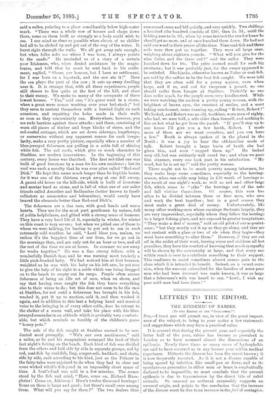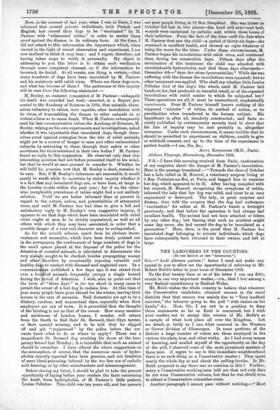LETTERS TO THE EDITOR.
THE EPIDEMIC OF RABIES.
LTO THE EDITOR OF THE " SPECTATOR."1
SIR,-I trust you will permit me, in view of the great import- ance of the subject, to bring to your notice a few statements and suggestions which may have a practical value.
It is averred that during the present year, and especially the latter half of the year, rabies has become so prevalent in London as to have assumed almost the dimensions of an epidemic. Nearly three times as many cases of hydrophobia
are said to have occurred as in any former year within medical , experience. Hitherto the disease has been the rarest known; it
is now frequently reported. As it is not a disease capable of being spread by infection like small-pox or fever, and as its spontaneous generation in either man or beast is emphatically declared to be impossible, we must conclude that the present epidemic is due to transmission by the direct bite of rabid animals. So unusual an outbreak reasonably suggests an unusual origin, and points to the conclusion that the increase of the disease must be due to an increase in the foci of contagion.
Now, in the summer of last year, when I was in Paris, I was informed that several private individuals, both French and English, had caused their dogs to be " vaccinated " by M. Pasteur with "attenuated rabies," in order to render them proof against the disease in its ordinary form. At the time, I did not attach to this information the importance which, when viewed in the light of recent observation and experiment, I am now inclined to think it may bear ; and I regret, therefore, not having taken steps to verify it personally. My object in addressing to you this letter is to obtain such verification through some competent channel, or, if the information be incorrect, its denial. At all events, one thing is certain,—that many hundreds of dogs have been inoculated by M. Pasteur and his assistants with rabid virus. Where are these dogs now, and what has become of them ? The pertinence of this inquiry will be seen from the following statement :- M. Bonley, an eminent compatriot of M. Pasteur—unhappily his death was recorded last week—asserted, in a Report pre- sented to the Academy of Sciences in 1884, that animals, them- selves refractory to rabies, were capable, after inoculation with its virus, of transmitting the disease to other animals in so violent a form as to cause death. When M. Pasteur subsequently read his last communication before the Academy of Sciences, M.
relying on his own experiments and investigations, asked whether it was improbable that inoculated dogs, though them- selves proof against contagion from the bite of rabid animals, might yet be a source of danger to man and other nninoculated subjects, by conveying to them, through their saliva or other secretions, the virus contained in their own bodies ? M. Pasteur found no reply to this suggestion. He observed only that this interesting question had not before presented itself to his mind, but that he would at once proceed to consider it. Whether he will fulfil his promise, now that M. Bonley is dead, remains to be seen. But, if M. Bonley's inferences are reasonable, it would surely be worth while to ascertain by strict inquiry whether it is a fact that any inoculated dogs are, or have been, at large in the London streets within the past year ; for if so, the other- wise inexplicable prevalence of rabies might find a not unlikely solution. Until we are better informed than at present in regard to the nature, action, and. potentialities of attenuated virus, and until M. Pasteur has had time to give a full and satisfactory reply to M. Bonley's very suggestive inquiry, it appears to me that dogs which have been inoculated with rabid virus ought at once to be strictly sequestered, as well as all others with which they may have associated, in order that a possible danger of a very real character may be extinguished.
As for the muzzle scheme, apart from its obvious incon- veniences and anomalies, which have been freely pointed out in the newspapers, the confinement of large numbers of dogs in the small spaces placed at the disposal of the police for the detention of arrested animals, is calculated to disseminate the very malady sought to be checked, besides propagating mange and other disorders by occasionally exposing valuable and healthy dogs to contact with diseased and neglected curs. In a communication published a few days ago, it was stated that over a hundred animals frequently occupy a single kennel during the period of detention. I wish, also, to point out that the term of "three days" is far too short in many cases to permit the owner of a lost dog to reclaim him. At this time of year many people have gone abroad for the winter, leaving their houses in the care of servants. Paid domestics are apt to be a dilatory, careless, and unpunctual class, especially when their employers are out of town. It is proverbial that the thought of the hireling is not as that of the owner. How many masters and mistresses of London homes, I wonder, will return from the South to find their St. Bernard, their Skye terrier, or their spauiel missing, and to be told that he slipped off and got " suppressed " by the police before the ser- vants knew what to do or where to apply ? There was a magnificent St. Bernard dog awaiting his doom at the tem- porary kennel last Monday ; it is incredible that such an animal should be ownerless. I have offered the above suggestions on the assumption, of course, that the numerous cases of hydro- phobia recently reported have been genuine, and not fatalities of mere blood-poisoning induced by the too free use of carbolic acid dressing, or by other misadventure and mismanagement.
Before dosing my letter, I should be glad to take the present opportunity of laying before your readers the facts concerning the death, from hydrophobia, of M. Pasteur's little patient, Louise Pelletier. This child was ten years old, and her parents are poor people living at 18 Rue Dauphine. She was bitten on October 3rd last in two places—the head and arm—and both wounds were cauterised by carbolic acid within three hours of their infliction. From the date of the bites until the date when M. Pasteur first saw the child—a period of thirty-six days—she remained in excellent health, and showed no signs whatever of being the worse for the bites. Under these circumstances, M. Pasteur began his inoculations with rabid virus, and continued them during ten consecutive days. Fifteen days after the termination of this treatment the child was attacked with unmistakeable hydrophobia, and died three days afterwards— December 4th—" dans des crises eponvantables." While she was suffering with the disease the inoculations were repeated; but no other treatment was applied. Who shall say whether little Louise Pelletier died of the dog's bite which, until M. Pasteur laid hands on her, had produced no harmful result, or of the repeated inoculations with rabid matter to which he subjected her ? These operations are all, it must be remembered, emphatically experiments. Even M. Pasteur himself knows nothing of the supposed "microbe " of rabies, its method of action, or its peculiarities when transferred to the human subject. His hypothesis is, after all, slenderly constructed ; and facts re- cently published by contemporary savants tend to show that his line of inquiry may be, and probably is, altogether erroneous. Under such circumstances, it seems terrible that he should be permitted to experiment on children, unable to give or withhold consent, and up to the time of the experiment in perfect health.—I am, Sir, &c., ANNA. KINGSFORD (M.D., Paris). Atcham Vicarage, Shrewsbury, December 19th,.
P.S.—I have this morning received from Paris, confirmation of my suspicion about the danger of M. Pasteur's inoculation. Here is the passage translated :—" Towards the close of October last a lady called on M. Boarrel, a veterinary surgeon living at 9 Rue Fontaine-an-Roi, at Paris, and begged him to examine her dog, which appeared to be ill. After having complied with her request, M. Bourrel, recognising the symptoms of rabies, informed the lady that her dog was rabid, and must be at once sequestered or destroyed. The lady, in great surprise and dismay, then told the surgeon that the dog had undergone vaccination' for rabies at M. Pasteur's hands a fortnight previously, and that before the operation it had always had excellent health. The animal had not been attacked or bitten by any other dog ; but fearing that such an accident might some day occur, she had caused the dog to be inoculated as a precaution." Here, then, is the proof that M. Pasteur has inoculated dogs belonging to private individuals, which dogs have subsequently been returned to their owners and left at large.



































 Previous page
Previous page